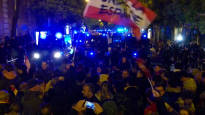BARCELONA Late last night, Spain entered a new era when the acting prime minister Pedro Sánchez negotiated with the Catalan separatist parties with a historical agreement.
During negotiations in Brussels, Sánchez and the Catalans agreed on a bill that would grant amnesty to thousands of members of the Catalan independence movement.
At the same time, the country is saved from new elections, as the parties promised support for Sánchez’s left-wing coalition as a result of the agreement.
The right-wing Partido Popular won the July elections, but it did not get the necessary number of seats to form a government.
The continuation of the left-wing government that was in power has depended on the support of the nationalist parties of the Basque Country and Catalonia.
The former regional manager gets to return to Spain
Catalans have long demanded independence for the region.
Six years ago, the Catalans’ desire for independence led to a vote for the region’s independence against the Spanish constitution.
At the polling stations, the police force sent to Catalonia by the Spanish central government used harsh measures against the voters.
The result was violence, demonstrations and an explosion of support for the Catalan independence movement.
The region unilaterally declared itself independent for a while and some of the leaders of the independence movement were imprisoned. Others fled the country, the regional leader of Catalonia at the time Carles Puigdemont including.
He lives in exile in Belgium and is now able to return to Spain.
Spain is moving further away from the legacy of the dictator Franco
In addition to amnesty, the Catalans’ list of demands also included greater self-determination and financial benefits. Catalan and other minority languages already became official administrative languages in the Spanish Parliament.
Last year, Sánchez also overturned the sentences of jailed Catalan leaders.
With the concessions, Sánchez moved Spain even further away from being a dictator Francisco Franco of inheritance.
The dictator who ruled the country for almost 40 years emphasized the unity of Spain, banned the speaking of Catalan and other minority languages and persecuted minorities.
The agreement made now is historic and supports the idea of Spain as a multinational state with several languages and cultures.
The right-wing tried to circumvent the law through the courts
The creation of the agreement guarantees that Spain will have a government by the end of this month.
However, the final content of the agreement is still pending and negotiations continue.
Former regional leader Carles Puigdemont’s Junts party demands, among other things, a binding referendum on the region’s independence.
However, its realization does not seem very likely at the moment.
Also, the amnesty law has not yet been ratified.
The Spanish right-wing, which has tried until the last to defeat the law through the courts, is beating the carts.
In Spain, Supreme Court judges are chosen by a council appointed by the government. The current council was chosen by the previous right-wing government.
Spain has received many from the EU remarks that the country’s judiciary is not independent.
However, with these prospects, the amnesty law will be ratified in the Constitutional Court, where its passage is likely.
The support of the extreme right can be seen on the street
Many Spaniards do not like the agreement.
On Tuesday, in the capital Madrid, almost 7,000 protesters gathered in front of the Socialist Party office. They called Pedro Sánchez a traitor and accused him of selling Spain to Catalonia.
The demonstrations were called by the far-right Vox party and other far-right organizations. The strength of the protests shows that Franco’s legacy still lives strong in Spain.
The agreement with the Catalan separatists also accelerates the division of Spain.
Vidal-Quadras has been taken to hospital to recover from his injuries.
The police have not caught the perpetrator yet, but are looking for a motorcycle rider wearing a black helmet.
Vidal-Quadras defected from PP to Vox around the time of its founding.
Demonstrations continue in the streets of Spanish cities
The Vox party grew in Spain as a protest against the Catalan independence movement. For the extreme right, the agreement with the separatists is fuel for the flames.
The agreement between Sánchez and the Catalan separatists also divides the ranks of the socialist and nationalist parties.
The protests in Spain’s biggest cities are likely to continue for a long time, and Sánchez will be under the magnifying glass throughout the next election season.
Spain is now one of the few EU countries where the left is in power.
About the topic in -Areena
Outside line from 2018: Spanish Revenge
Outside line from 2017: Catalonia – the war of flags
